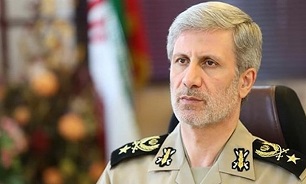Iran's Retaliatory Missile Strike Just Warning to US
 "The American commanders who had been used to show to the public their hollow power by heavy fire against other countries, while those countries were in weak conditions, and against the defenseless nations, felt the scorching heat of the Islamic Revolution Guards Corps (IRGC)'s missile power," General Hatami said, addressing a ceremony in Tehran on Thursday.
"The American commanders who had been used to show to the public their hollow power by heavy fire against other countries, while those countries were in weak conditions, and against the defenseless nations, felt the scorching heat of the Islamic Revolution Guards Corps (IRGC)'s missile power," General Hatami said, addressing a ceremony in Tehran on Thursday.
"I hope that the enemies never make a decision to test the Iranian nation's determination because what was carried out, was just a warning and a slap," he added.
On January 8, the IRGC Aerospace Force started heavy ballistic missile attacks on US Ein Al-Assad airbase in Southwestern Iraq near the border with Syria and a US operated airbase in Erbil in retaliation for the US assassination of IRGC Qods Force Commander Lieutenant General Qassem Soleimani.
Ein Al-Assad is an airbase with a 4km runway at 188m altitude from sea levels, which is the main and the largest US airbase in Iraq. Early reports said the radar systems and missile defense shields in Ein Al-Assad failed to operate and intercept the Iranian missiles. Unofficial reports said the US army's central radar systems at Ein Al-Assad had been jammed by electronic warfare.
The second IRGC reprisal attack targeted a US military base near Erbil airport in Iraqi Kurdistan Region in the second leg of "Martyr Soleimani" reprisal operation.
Iraq said the attacks had not taken any toll from its army men stationed at these two bases. The US army had blocked entrance into Ein Al-Assad to everyone, including the Iraqi army.
It was the first direct attack on the US army ever since world war two.
The IRGC officials said none of the missiles had been intercepted.
Message end/
